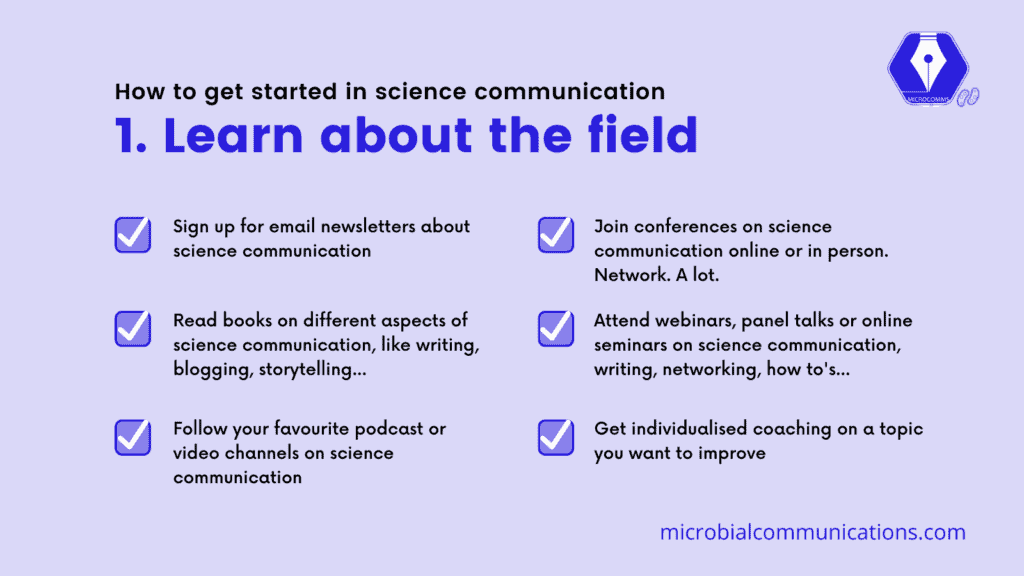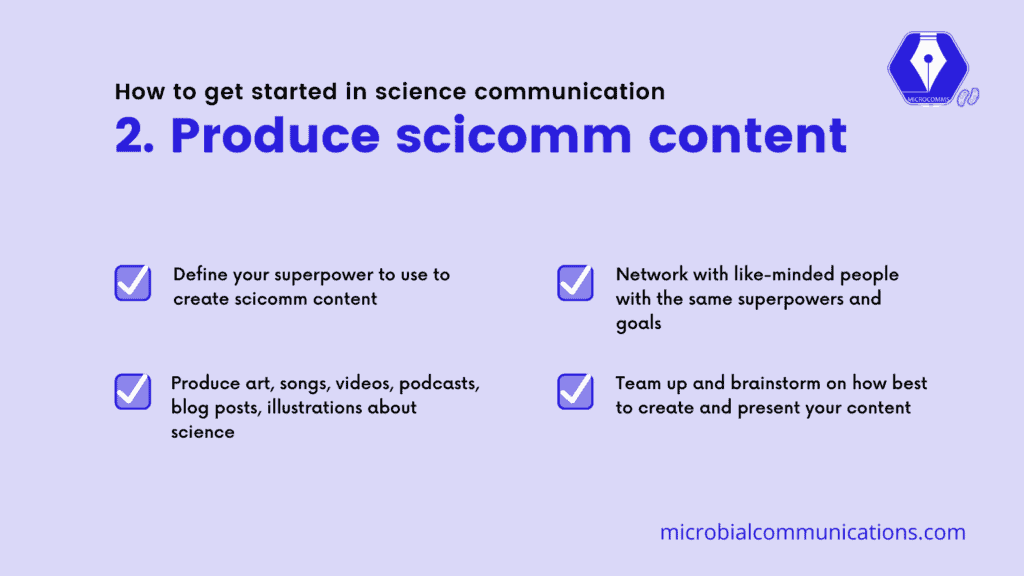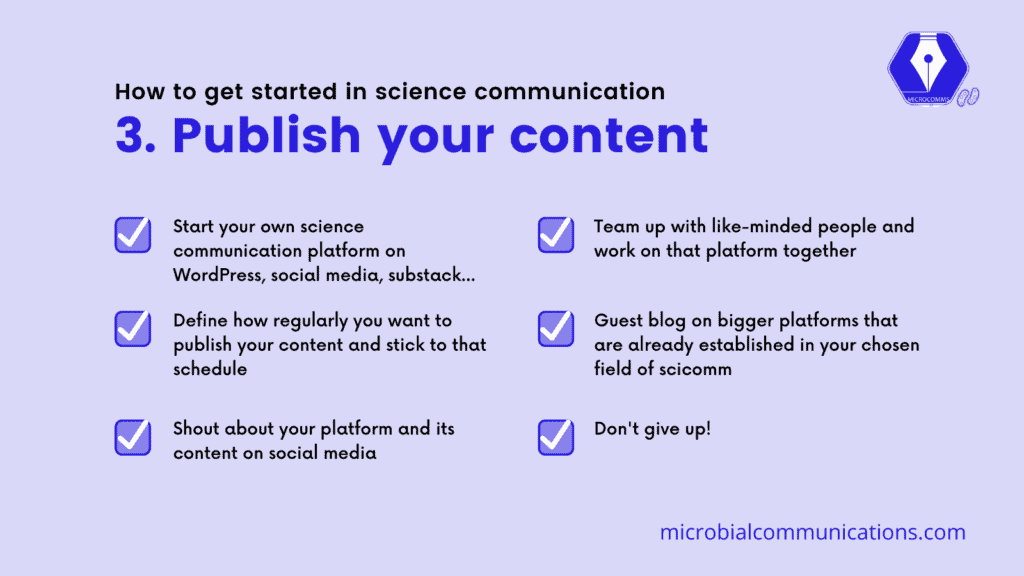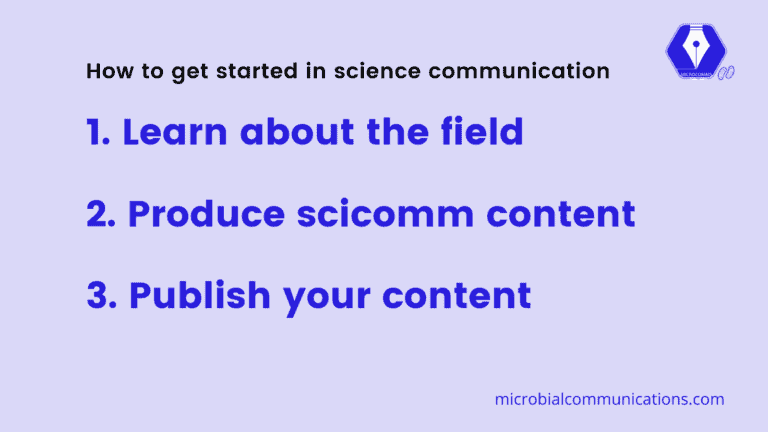When you ask science communicators how they got into the field, you will surely get many different answers. It seems that there is no one path into this exciting field. Everyone somehow carved out their own niche and walked their own walk and ended up where they currently are.
However, if you decide to get into science communication and make it part of your career, I recommend following these three steps:
- Learn about science communication and your specific niche
- Produce science communication content using your skill(s)
- Publish your content on a platform
Each of these steps can look differently depending on who you ask. Consider the way you prefer to learn, the skills you have to produce content and where and how you want to publish your content. So, here I want to give you some ideas on how to get into science communication and tips to establish yourself in the field.
Learn about science communication
Obviously, before diving into any sort of activity, you have to understand how it works. You need to acquire or manifest certain skills to establish yourself in the field.
Lucky you, that there are loads of resources for science communication aspirers. And it is completely up to you to decide how to learn, how to engage with content and which form of content you prefer.
So, here I compiled a list of science communication resources from which you can learn the basics. Please note that this is not an exhaustive list (I am grateful for any comments and more resources in the comment section below). Also, I recommend anyone who knows right away that they want to get into science communication, consider doing a degree in the field.

Read books, blogs or newsletters
When I decided to dive into the field of science communication, I read any book and guide I could find about this topic. I compiled my favourite books on science communication for those who are looking for helpful resources.
With e-mail Newsletters becoming incredibly popular, I highlight here my favourite ones that I use to stay up-to-date with the field:
- The SciCommer by Heather Doran
- Science Writing News Roundup by Marianna Limas
Lastly, follow and read blogs on science communication. These share background on scicomm or give tips on different aspects of science communication. For example, on my blog #ScienceWritingTips, I talk about ways to improve scientific writing both for academics and non-academics.
On the Open Notebook, you can find many resources from science journalists about how to write stories about science and everything else that is important for efficient science writing.
Listen to podcasts
When it comes to podcasts, I have one favourite: I absolutely love Alan Alda’s Clear and Vivid podcast, in which he talks to scientists and science communicators. Generally, the podcast is about communication, relating to an audience and empathy. And with the way Alan talks to his guests about their research, you can learn a lot about how to conduct interviews with scientists and help them find the right words.
Another great podcast on science communication is by Sophie talks science. As an experienced science communicator, she explains which tools or traits you need for a science communication career. Sophie also talks about how to get started in science communication and how to find your dream job.
Otherwise, you can find an extensive list of scicomm podcasts in this Google sheet.
Join conferences
Following a few conferences on science communication throughout the year will probably give you the most in terms of knowing what is going on in the field. Science Talks organises one of the biggest conferences for science communicators every year and is probably one of the best conferences I ever attended. They usually have talks on the science of science communication or introduce new initiatives or Slams for new scicomm project ideas.
The new initiative SciPeP gave their first virtual conference on Communicating the Future. You can still watch their sessions for free on their website. Definitely worth checking out!
Get individualised coaching
If none of these ways to learn sound appealing to you, you might consider getting personalised coaching. This can include workshops or webinars on science communication for example from the Alan Alda Centre of Science Communication that teaches the so-called Alda Method. This aims to establish trust and empathy with your audience and is meant to help scientists relate with their audience to communicate their science.
Other workshops can focus more on storytelling in science communication. Or you can hire me as a coach to guide you through the process of writing your very first science writing article. Over a period of weeks, we will together develop a strategy to outline and write your piece with the aim to explain your complex science in simpler terms and find the right voice for your target audience.
If you are looking to educate a team of researchers or your lab members on science communication, you can hire me to give a webinar on a chosen science communication topic. Send me an email and let me know what you are looking for and which science communication message you want me to convey in the webinar.
Produce science communication content…

Okay, now you learned how to get started in science communication and what it takes to be a science communicator. Next, you need to figure out what sort of science communication content you can and want to produce.
Generally, I suggest you go with the skill you are most comfortable with. Then, think about what sort of content you can produce with it.
You might be a skilled drawer who likes to create comics, animes or watercolours. You might be able to create amazing and colourful pieces to explain any type of science with this skill. Then the SciArt community of Lifeology might be a good platform to check out.
Other artists like to stitch, glue, dance or sing about scientific topics. There are no boundaries on what to do and how to use your skills to bring across a scientific message!
Maybe you like putting pen to paper and writing about scientific concepts and even aim to become a science writer. Then, writing about science might be your way to go, so get some inspiration about what science writers do.
Or maybe you like talking about science to your audience. Then starting a podcast or video channel could work for you.
Note that your preferred way of engaging with content usually becomes your preferred way of producing content. I, for example, am a great reader, always have been. So, for me, it was easy to decide to become a writer. Whatever your preferred skill is, make sure you feel completely comfortable using it and then get started!
…and publish your science communication content

So, you figured out which of your superpowers you want to use to create science communication content. Now, it is time to start a platform where you publish your content. You will use this platform to showcase your scicomm products and establish yourself as a science communicator.
Start your own science communication platform
Starting a website or social media platform about a topic that you’re really passionate about, is not that difficult. Make sure you stick to the skill that you feel most comfortable with!
To start your own website, podcast, video channel or social media account does not take too much. There are lots of resources out there that tell you how to start a science blog or launch a science podcast. Even for starting a science website, you can find helpful guides and blog posts – yes a blog on blogging does make sense, right?!
After you set up your project, it comes down to your own motivation and how often you want to publish your science communication content. I suggest not setting your goal too high at the beginning. At the same time, you want it to be high enough so you take the project seriously. Find the right way that works for yourself.
This could look completely different for everyone: Two short social media posts per week; one longer blog post every week; one podcast episode every two weeks or one video per month. It’s all up to you – one of the perks of having your own science communication project! And don’t forget to shout about your project on your social media platforms to reach the right audience!
Guest blog or team up
Maybe the idea of you alone starting a website, blog or video channel does not appeal to you. Maybe you would rather have the support of a team. That is totally fine as well.
Find some people that have the same goals as you. And together you can start an even bigger project. I can also tell you from experience that a science communication team project is more fun than going it alone. You always have someone to rely on but also to be accountable for. Plus, brainstorming with people with similar goals will get you amazing results, pretty sure of that!
Or you can join an already established team as a volunteer. There are bigger blogging consortia like SciRio or ClubSciWri. Connect with them and publish posts with them while also getting feedback from their seasoned writers and editors. Or maybe you want to produce videos about STEM-related topics. Then check out STEMcognito as they are always grateful for any support.
How can YOU get started in science communication
There is no right or wrong way of getting started in science communication. The important point is that you get started!
You can start slowly or go all in right from the beginning. Completely up to you as long as you show that you indeed want to communicate science. And then let’s see how you like it or whether you might stick with it … 😉

